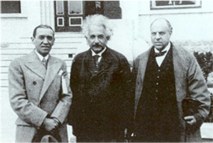Professorship offered by Madrid
Texts by Dr. Antonio Moreno González
After he went into exile from Germany, France offered him a tailor-made course at the College de France; Britain offered him citizenship; and other countries aspired to tempt him to their universities. As we all know, it was America which finally succeeded. Spain also tried to attract him.
In April 1933 the Minister for Education and the Arts, Fernando de los Ríos, announced that Einstein had agreed to take charge of an extraordinary professorship in a research institute, which would bear the name Instituto Albert Einstein, under the science school of the central university of Madrid. Among those involved in the task were Ramón Pérez de Ayala, writer, the then Spanish ambassador to Great Britain, and Abraham Shalom Yahuda, a lecturer in Hebrew at the university in Madrid, chosen by Einstein as his spokesman on this issue. The details of this laudable undertaking by the republican government to support science, by attracting figures as renowned as Einstein, are told by J. M. Sánchez Ron and T. Glick in La España posible de la Segunda República (Universidad Complutense, Madrid, 1983).
In reality, Einstein's initial intention was to spend short sojourns in a number of different places: Leiden, Oxford, Paris, Caltech, Princeton and even Spain, when he was still toying with the possibility of accepting the chair in Madrid. He made this very clear in a letter he sent to Pérez de Ayala, in reply to the latter's offer to provide him with a house, a gift from the Spanish government: "For a gypsy such as myself, who can only stay in Spain for a relatively short time, it would be much better for me to stay in a hotel... A house, as Schopenhauer so rightly observed, is rather like a woman: rather than possessing her, one is possessed by her".
Although Einstein did consider the possibility of heading the Institute himself, his idea was to set up someone he trusted in the post. The first name Einstein proposed was the Nobel prize winner, Max von Laue, who had a good grasp of his theory of relativity. Laue was not a Jew, as Einstein warned Yahuda in the letter (5/5/1934) putting forward his name, but his persistent defence of his Jewish colleagues had made it untenable for him to remain in Berlin. It was difficult to find suitable names for the post at that point, because "the most important exiled Jewish colleagues in the field, have already found positions", wrote Einstein. As we can see, the creation of the chair in Madrid was linked to attempts to help the Jewish cause, but Einstein began to give up hope:
"I have wracked my brains about the Spanish professorship. Apparently Laue doesn't want to go. He is hesitating a lot and even doubts whether he will leave Germany: It is even rumoured that Hitler is beginning to teeter. The situation is very different with regard to Born. Apparently, he is trying to use this offer to set himself up in England. However, if he does not manage, he would probably accept the position in Spain. It would be good for us to know soon how things stand. If it doesn't work out with Born, I will appoint Dr. Leopold Infeld". (Einstein to Yahuda, 10/6/1934)
he possible names were first rate, but Einstein declined to take possession of the chair, a precondition for appointing someone permanently to the Institute. This may have been because he had already opted for Princeton and also because the political situation was becoming so strained that it hindered a satisfactory conclusion of negotiations over the professorship. Franco's uprising, which came just a short time later, was to put paid to these and many other great plans for Spanish science.

With Ramón Pérez de Ayala and Abraham Yahuda who informed Einstein of the decision of the government of the Spanish Republic to create a Chair for him at the Universidad Central de Madrid, 1933
